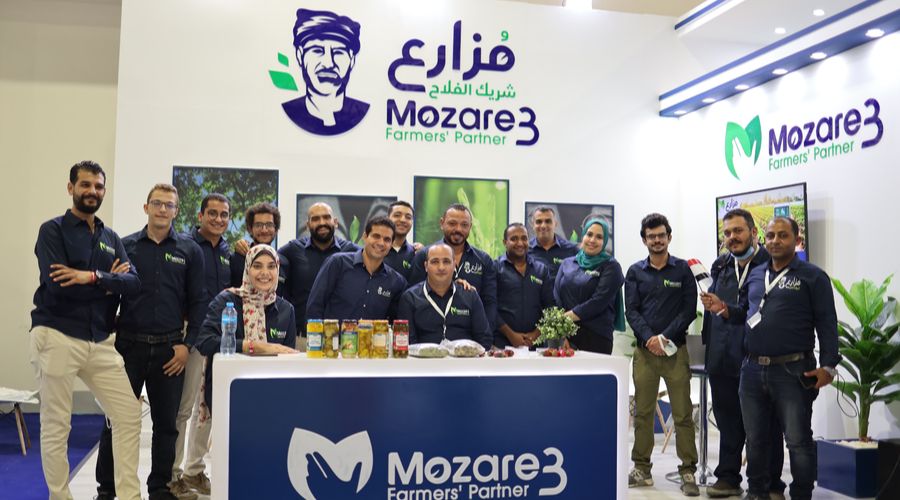Mozare3: Enabling small farmers in Egypt to become bankable

The agriculture sector is the largest employer in Egypt; nearly 28 per cent of the total workforce work in agriculture, according to USAID. However, across the agri-food supply chain, small farmers are the ones who usually make the least profit margins.
Confronted with a myriad of challenges such as rising inflation rates, the high costs of imported agricultural inputs, as well as the global fluctuations in supply and demand triggered by the Covid-19 crisis, small farmers still suffer economically, especially amid the lack of government direct support.
“There have been a lot of efforts made by development agencies and governments to improve the situation of small-scale farmers throughout the past 10-12 years. However, most of these programmes are short-term and tackle one side of the problem, so we wanted to build a product that could address the top issue impacting smallholder farmers, be they financial, technical and commercial,” says Hussein Abo Bakr, co-founder of Egypt-based agri-fintech startup Mozare3.
Founded by Abo Bakr, Tamer El-Raghy, and Mohamed Okasha in May 2021, Mozare3 looks to bring financial services to unbanked farmers.
The startup banks on the growing need for microcredit loans by farmers amid the current surge in mobile payments accelerated by the Covid-19 crisis. It hopes to become a one-stop-shop where farmers can perform financial transactions digitally, such as paying bills, transferring money, buying goods and services.
The lack of timely, adequate funding directed towards small farmers is one of the major sore points facing small farmers. As a result, farmers usually turn to individual investors for cash.
"Unlike large farmers, smallholder farmers don't have the assets required to justify loans and if granted, they are not found to be large enough to cover the farming process itself," says Abo Bakr. “[We] aim to address the age-old challenge of cash flow seasonality by offering micro-loans for farmers to help them finance the entire agricultural process and become financially included.”
Additionally, the startup offers a wide range of embedded finance products, enabling farmers to purchase pesticides and seedlings, fertilisers and other supplies. After the yield is sold or exported, the farmer can then pay off the amount borrowed along with the costs of these products through a series of installments.
Contract farming
Aiming to enable farmers to secure a steady stream of income, Mozare3 also facilitates contract farming agreements for farmers, connecting them to a network of manufacturers and off-takers, which Abo Baker cultivated through his work at Plantform, an agro-processing company that he founded six years ago. The company sources raw materials and fresh produce directly from farmers, turns them into food products and sells them in Egypt as well as international markets.
For Abo Bakr, Mozare3 serves as a step towards more "horizontal expansion" to serve more farmers and link them to manufacturers through a data-driven tool.
“Contractual farming enables farmers to plan ahead, invest and also be financed while allowing them to have backward visibility on their agricultural supply chain. Meanwhile, it gives the exporter the ability to boost the volume of their sales at a pre-agreed price. Disrupting [contract farming] by making it a technologically driven process will eventually help it gain further momentum in Egypt and Mena,” he explains.
Of the 20,000 farmers who use the Mozare3 app,1000 farmers are working directly with seven manufacturers listed on the platform. Next year, it hopes to onboard as many as 1500 farmers as well as more manufacturers.
Funding
In May 2021, Mozare3 raised a $1.1 million pre-Seed round led by Algebra Ventures and Disruptech, and is in the process of closing another round in the coming period.
Working in a niche segment like agriculture and finance has raised the stakes for Abo Bakr to secure funding, but being an early mover helped create more awareness on the market especially among investors.
“[Agritech] still is considered an unsung segment at large, let alone the agri-fintech,” he says. “While it was not easy at first to explain the concept to investors, we had the early-mover advantage. Besides, I think investors, now more than ever, are looking to diversify into other verticals and back solutions that tackle complex issues and respond to the needs of communities that are at the heart of society," Abo Bakr concludes.


